Blog (446 found)
As the Burma Army Fires Live Rounds, the MNHRC Fires Blanks
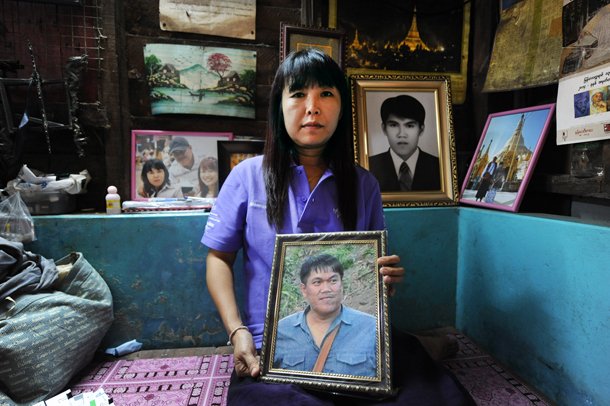 The Myanmar National Human Rights Commission (MNHRC) once again proved the futility of its existence with a deeply unsatisfactory investigation into the murder of journalist Aung Kyaw Naing, a.k.a. Ko Par Gyi by the Burma Army. Rather than providing meaningful avenues for redress for the victim and his family, the investigation report serves to act as a cover for the Burma Army, which is continuing to commit such human rights abuses throughout Burma’s ethnic areas.
The Myanmar National Human Rights Commission (MNHRC) once again proved the futility of its existence with a deeply unsatisfactory investigation into the murder of journalist Aung Kyaw Naing, a.k.a. Ko Par Gyi by the Burma Army. Rather than providing meaningful avenues for redress for the victim and his family, the investigation report serves to act as a cover for the Burma Army, which is continuing to commit such human rights abuses throughout Burma’s ethnic areas.
Ko Par Gyi was a freelance journalist covering the conflict between the Democratic Karen Benevolent Army (DKBA) and the Burma Army when he was taken into military custody. Five days later he was tortured before being shot to death. The marks of torture were obvious to Ma Thandar, Ko Par Gyi’s wife, when she viewed the dead body. After calls from human rights groups as well as the US State Department, for an independent investigation, President Thein Sein consequently asked the MNHRC to conduct an investigation, the results of which were released on 2 December 2014.
The MNRHC investigation report, however, does not address the key issues surrounding this case, is full of inconsistencies, and does not include key pieces of evidence. It does not provide any explanation of the signs of torture that were clear on his body. The report claims that there had been a fight in which the gun had gone off; however, according to forensic experts that Ko Par Gyi’s wife has spoken to, he had been shot five times, one of which was point blank through the chin, implying that he had been shot four times before being killed. […]
• • •How Many More Lives? Burma Army Must Immediately Halt its Offensives in Kachin State
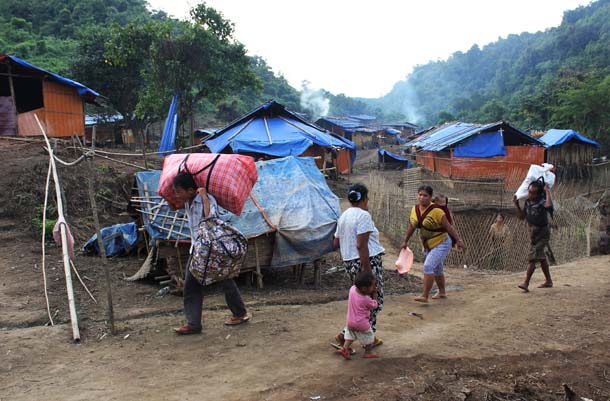 Despite repeated calls from the international community, governments and civil society for an immediate halt to hostilities in Kachin and northern Shan State, on 19 November, 2014 the Burma Army fired several artillery missiles as “warning shots” onto the Kachin Independent Army’s (KIA) training academy in Laiza, Kachin State, killing 23 cadets and seriously injuring 20 others. Laiza is not only the KIA’s strong-hold. It is a city with over 20,000 civilians and a host to over 17,000 internally displaced persons (IDPs).
Despite repeated calls from the international community, governments and civil society for an immediate halt to hostilities in Kachin and northern Shan State, on 19 November, 2014 the Burma Army fired several artillery missiles as “warning shots” onto the Kachin Independent Army’s (KIA) training academy in Laiza, Kachin State, killing 23 cadets and seriously injuring 20 others. Laiza is not only the KIA’s strong-hold. It is a city with over 20,000 civilians and a host to over 17,000 internally displaced persons (IDPs).
Just days after the killing in Laiza, the Burma Army began firing shells near IDP camps. Some of the shells landed near a boarding school housing about 1,000 IDP children. These subsequent attacks near the camps threatened the lives of over 10,000 IDPs and raised much anxiety among the most vulnerable communities who have continuously fled the conflict. Fortunately, no one was hurt in these attacks, but many of the IDPs were forced to flee again in terror to the nearby jungle.
The narrative of “reform” and the sweeping political changes that have been praised and funded by the international community is quickly coming apart at the seams. While the Burma Government continues to use its rhetoric of change and democracy to encourage international governments, donors and investors to continue funding the peace process and development projects, they made one of the most deadly targeted attacks in Kachin State since the ceasefire broke down in 2011. This attack raised serious doubts among the ethnic groups who have threatened to abandon talks aimed at achieving a nationwide ceasefire accord. These talks, ongoing for nearly two years, have proved to be thus far redundant, as the Burma Army obviously has no other goal than the elimination of all ethnic armed groups without committing to any genuine, structural reforms. […]
• • •Constitutional Stalemate Sinks Hopes of Genuine Democracy and National Reconciliation
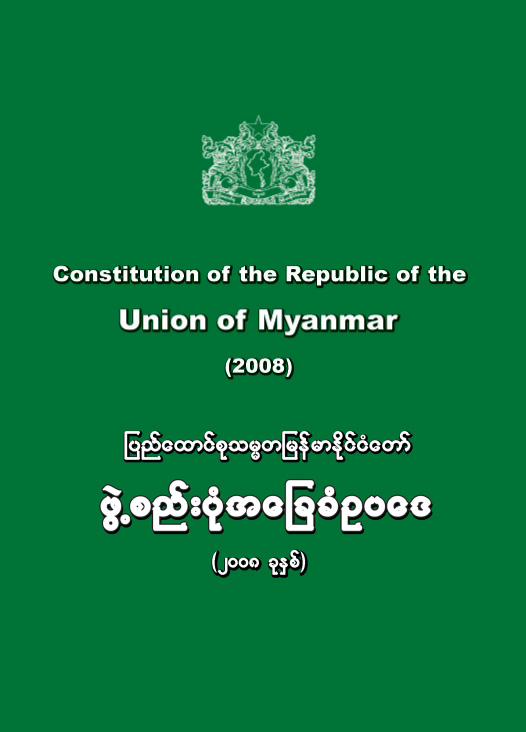 On Tuesday 18 November, Parliamentary Speaker of the lower house of the Burma Parliament Thura Shwe Mann boldly announced – to everyone’s great frustration but no one’s great surprise – that there would be no amendments made to the controversial 2008 Constitution before the 2015 national elections. So, what are the implications of this announcement, and why is the timing significant?
On Tuesday 18 November, Parliamentary Speaker of the lower house of the Burma Parliament Thura Shwe Mann boldly announced – to everyone’s great frustration but no one’s great surprise – that there would be no amendments made to the controversial 2008 Constitution before the 2015 national elections. So, what are the implications of this announcement, and why is the timing significant?
The implications for democracy in Burma are threefold. First, unless Article 59(f) is amended, Daw Aung San Suu Kyi will not be able to lead her NLD party and run for President in the 2015 elections. Although many have long feared the worst, thus far hope has persisted, especially in light of the NLD’s highly successful campaign in favor of constitutional amendment, which attracted five million signatories in support. However, Thura Shwe Mann now seems to be calling time on Daw Aung San Suu Kyi’s political career – and the dreams of so many long-suffering and long-hopeful Burmese – smoothly but ruthlessly side-lining her until such time as she can safely be labeled a political irrelevance, and dumped for good. At the same time, his comments can be interpreted as an oblique, discreet and wily announcement of his own ambitions for a tilt at the presidency next year.
Second, without a significant overhaul of the 2008 Constitution to ensure that the rights, autonomy and self-determination of ethnic minority nationalities are respected and enshrined in law, the peace process does not stand a chance. Fighting rages on in Kachin State – not to mention in northern Shan and Karen State – with no sign of abating. The day after Thura Shwe Mann made his announcement, 23 Kachin and other ethnic nationality soldiers were killed and as many as 15 wounded when Burma Army troops fired on a military training base in Laiza, the strategic headquarters of the Kachin Independence Army. […]
• • •Are You Listening, President Obama?
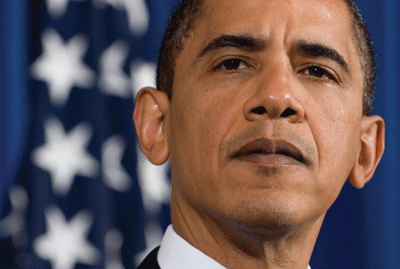 US President Barack Obama’s made his much-anticipated second trip to Burma last week during the 25th ASEAN Summit, amid growing awareness that the reforms which he so eagerly celebrated during his 2012 trip are quickly unravelling – or being exposed for the stage-managed charade that they are.
US President Barack Obama’s made his much-anticipated second trip to Burma last week during the 25th ASEAN Summit, amid growing awareness that the reforms which he so eagerly celebrated during his 2012 trip are quickly unravelling – or being exposed for the stage-managed charade that they are.
In 2012, it was all too easy to trust the reform process. National elections had been scheduled for 2015, Daw Aung San Suu Kyi had been freed from house arrest and elected to Parliament, political prisoners had been released, a nationwide ceasefire process was underway with the majority of armed ethnic groups, and restrictions on media and civil society had been drastically loosened. And so the US and the international community embraced the reforms.
Yet, last month, in her recent address to the UN General Assembly, Special Rapporteur on the situation of human rights in Burma Yanghee Lee warned of the risks of backtracking. Then, earlier this month, Daw Aung San Suu Kyi labelled the process as “stalled” and remarked that “there have been times when the [US] government has seemed over-optimistic about the reform process.”
Furthermore, there has been a flurry of recent calls from civil society across Burma, directly raising their various concerns about the reform process with President Obama. The Karen Human Rights Group wrote an open letter drawing President Obama’s attention to human rights violations resulting from the ongoing government military presence throughout south-eastern Burma; […]
• • •Impunity for Military Abuses Has to End
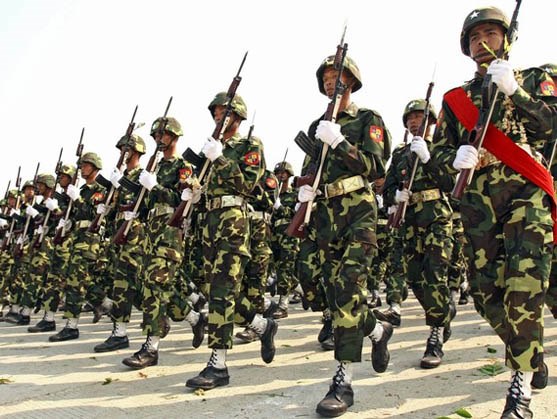 On 7 November, the International Human Rights Clinic (the Clinic) at Harvard Law School published a Legal Memorandum which establishes that certain Burma Army commanders are guilty of crimes against humanity and war crimes under international criminal law. The Legal Memorandum submits its findings on the basis of a three-year investigation (the Investigation) into human rights abuses associated with a Burma Army offensive in Karen State, which was launched in late 2005 and continued into 2008 (the Offensive). The Clinic chose this offensive “because it was one of the largest in recent memory and was widely condemned by the international community.” The Investigation focused specifically on the conduct of two military units – Southern Regional Military Command (SRMC) and Light Infantry Division 66 (LID 66) – in Thandaung Township, Karen State.
On 7 November, the International Human Rights Clinic (the Clinic) at Harvard Law School published a Legal Memorandum which establishes that certain Burma Army commanders are guilty of crimes against humanity and war crimes under international criminal law. The Legal Memorandum submits its findings on the basis of a three-year investigation (the Investigation) into human rights abuses associated with a Burma Army offensive in Karen State, which was launched in late 2005 and continued into 2008 (the Offensive). The Clinic chose this offensive “because it was one of the largest in recent memory and was widely condemned by the international community.” The Investigation focused specifically on the conduct of two military units – Southern Regional Military Command (SRMC) and Light Infantry Division 66 (LID 66) – in Thandaung Township, Karen State.
Articles 7 and 8 of the Rome Statute of the International Criminal Court (ICC) set out the legal requirements for an action to qualify as a “crime against humanity” or a “war crime,” respectively. The essence of a “crime against humanity” is that the act in question should be “part of a widespread and systematic attack directed against any civilian population, with knowledge of the attack.” Similarly, Article 8 stipulates that a “war crime” must be committed “as part of a plan or policy or as part of a large-scale commission of such crimes,” and must constitute a grave breach of the Geneva Conventions 1949, which regulate the conduct of armed conflict […]
• • •New National Land Use Policy Must Reflect the Concerns of those Affected
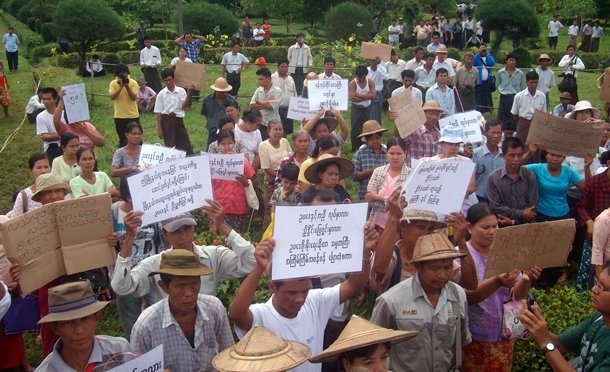 The Burma Government released its draft land use policy document and opened it up for consultations with the public. Despite this positive sign, the time for consultations is inadequate with no proper mechanism or space created for the meaningful participation of affected communities in order for their concerns to be reflected in the draft. The draft document itself has been heavily criticized for serving to further empower investors over small scale farmers.
The Burma Government released its draft land use policy document and opened it up for consultations with the public. Despite this positive sign, the time for consultations is inadequate with no proper mechanism or space created for the meaningful participation of affected communities in order for their concerns to be reflected in the draft. The draft document itself has been heavily criticized for serving to further empower investors over small scale farmers.
Since the beginning of the reform process in 2011, land grabbing, a practice that the previous military regime engaged in regularly, has hit new heights as a flurry of investors seek opportunities in previously untapped markets and the Burma Government liberalizes the economy. A prime example of this is the Dawei Special Economic Zone (SEZ) Project, a joint Thailand–Burma Government initiative that is seeking private investment to create one of the largest industrial zones in Asia. A report released by Dawei Development Association on 21 October 2014 highlights how 20-36 villages will be negatively affected. Concerns iterated by the local communities show that they have “lost farmlands and natural resources that are vital to their livelihoods, without prior information.” Furthermore “there was no meaningful consultation, and a deeply flawed compensation process.”
Land grabbing is often done with protection from the military, or by the military itself, for factories, infrastructure projects, mono-crop plantations, or military bases, and as with the Dawei SEZ case, usually without adequate or indeed, any compensation. It is a nationwide problem, both in ethnic areas, as documented by the Human Rights Foundation of Monland and Karen Human Rights Group, while in central Burma and delta areas, land grabbing is common place. Given that around 70% of the population of Burma is engaged in agriculture, and it is agricultural lands that are most often confiscated, it is one of the most pressing issues for Burma today […]
• • •Justice for the Killing of Journalist by Burma Army Must be Found
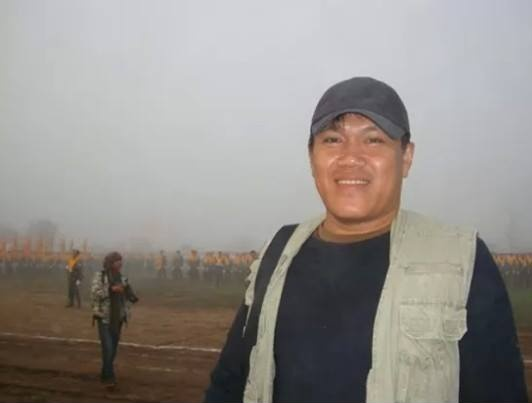 News of the murder of a journalist by the Burma Army while being held in custody should send shockwaves across the country and beyond, but sadly it is not much of a surprise for those who are aware of the abusive nature of the most powerful institution in Burma. What will transpire next will be a clear indicator of the Government’s will to pursue justice and end the impunity that the Burma Army has enjoyed for so long. Not many are optimistic.
News of the murder of a journalist by the Burma Army while being held in custody should send shockwaves across the country and beyond, but sadly it is not much of a surprise for those who are aware of the abusive nature of the most powerful institution in Burma. What will transpire next will be a clear indicator of the Government’s will to pursue justice and end the impunity that the Burma Army has enjoyed for so long. Not many are optimistic.
Aung Kyaw Naing, also known as Ko Par Gyi, was a freelance journalist covering the recent clashes in eastern Burma between the Democratic Karen Benevolent Army (DKBA) and the Burma Army and its’ proxy Border Guard Force (BGF). After visiting Kyaikmayaw, Mon State, the scene of heavy clashes in September 2014, Ko Par Gyi went missing. His wife, Ma Than Dar, began to search for him and held a press conference on 21 October in Rangoon stating that he was being held in custody by the Burma Army and demanded his immediate release. Just a few days later, a statement was issued to the Myanmar Press Council (Interim) by an aide to commander-in-chief of the armed forces, Min Aung Hlaing, that detailed Ko Par Gyi’s death while in custody. The statement claims that Ko Par Gyi was a captain for the Klohtoobaw Karen Organization (KKO), the political wing of the DKBA, and was shot dead while trying to escape. The DKBA has denied that Ko Par Gyi was indeed a member of their organization […]
• • •Over 650 Myanmar/Burma Civil Society Actors Speak Out on the Reality of the Transition
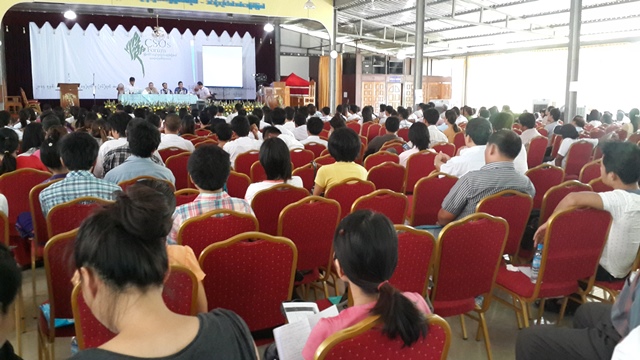 The forum titled, “Civil Societies’ Review on Myanmar/Burma’s Transition Process: Prospects for 2015 and Beyond”, held on 15 – 17 October 2014 at the Myanmar Christian Fellowship of the Blind Center in Rangoon, brought together over 650 representatives from 257 organizations and networks from across the country and border areas to discuss and strategize a wide range of key issues currently facing Burma in the context of the recent economic and political reforms since 2011. This is the first forum of this scale to assess the reform and the wide range of problems currently facing Burma.
The forum titled, “Civil Societies’ Review on Myanmar/Burma’s Transition Process: Prospects for 2015 and Beyond”, held on 15 – 17 October 2014 at the Myanmar Christian Fellowship of the Blind Center in Rangoon, brought together over 650 representatives from 257 organizations and networks from across the country and border areas to discuss and strategize a wide range of key issues currently facing Burma in the context of the recent economic and political reforms since 2011. This is the first forum of this scale to assess the reform and the wide range of problems currently facing Burma.
Despite the hailed “transition to democracy,” exalted particularly by the international community, civil society organizations (CSOs) spoke of the decades old challenges that remain unresolved, the stagnation of the reform process, and new emerging issues, in addition to the need for meaningful inclusion of the voices of civil society, democratic opposition forces, ethnic peoples, women and youth in the reform process.
The forum addressed six core issues; (1) law reform, (2) peace and conflict, (3) media, hate speech and communal violence, (4) Parliament, Government and accountability, (5) economic reform and foreign direct investment, and (6) the international community’s role and involvement, which were discussed under six panel discussions and six workshops. The forum produced a statement that gave concrete recommendations from civil society groups to the Burma Government, United Nations, international governments and international non-governmental organizations (lNGOs) […]
• • •Burma Army Continues to Use the Drugs Trade as a Weapon of War
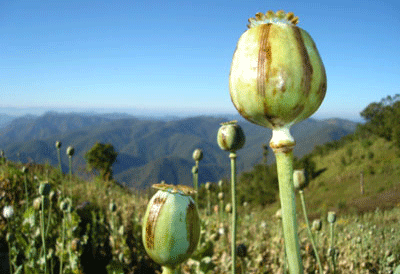 A new report by Kachin Women’s Association – Thailand (KWAT), “Silent Offensive: How Burma Army Strategies are Fuelling the Kachin Drug Crisis” outlines the severity of the drug problem in northern Burma as well as the complicity of the government in the trade. The report shows how the government is using opium-growing militia forces in its operations against the Kachin Independence Army (KIA) as part of a deal in which these militias are given free rein to produce and sell heroin and other narcotics.
A new report by Kachin Women’s Association – Thailand (KWAT), “Silent Offensive: How Burma Army Strategies are Fuelling the Kachin Drug Crisis” outlines the severity of the drug problem in northern Burma as well as the complicity of the government in the trade. The report shows how the government is using opium-growing militia forces in its operations against the Kachin Independence Army (KIA) as part of a deal in which these militias are given free rein to produce and sell heroin and other narcotics.
Thus, as the report points out, it is members of either Burma Army controlled Border Guard Forces (BGF) such as the New Democratic Army – Kachin (NDAK), a splinter group of the Kachin Independence Organization (KIO) that became a BGF in 2009, or People’s Militia Forces (PMF) that are heavily involved in offensives against the KIO. Land that is taken by the Burma Army and its proxy forces is then allocated to BGFs/PMFs to utilize however they like. This is often opium cultivation, heroin production and methamphetamine production. To make matters worse these are areas under which the KIO had previously been involved in anti-drug activities but since BGFs or PMFs have taken over, opium cultivation has increased greatly in areas such as Nampaka in northern Shan State and Chipwi in Kachin State […]
• • •“Winds of Change” Blow a Gale of Human Rights Abuses
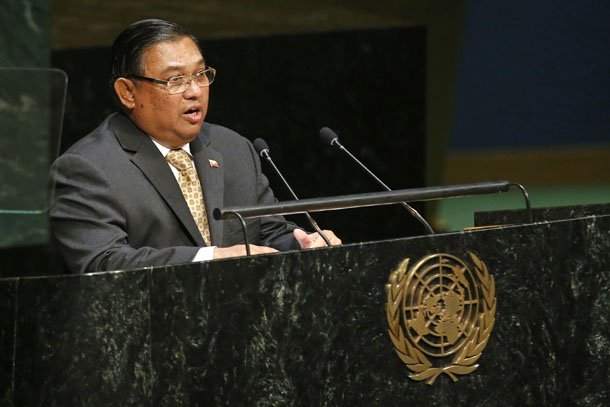 Burma’s Foreign Minister, Wunna Maung Lwin, gave a glowing report on the progress towards democracy and respect for human rights in Burma at the UN General Assembly (UNGA) yet given the deteriorating human rights situation on the ground, it is difficult not to view his words as a North Korean-esque sting in the tail.
Burma’s Foreign Minister, Wunna Maung Lwin, gave a glowing report on the progress towards democracy and respect for human rights in Burma at the UN General Assembly (UNGA) yet given the deteriorating human rights situation on the ground, it is difficult not to view his words as a North Korean-esque sting in the tail.
Wunna Maung Lwin specifically requested that Burma be taken off the agenda of the Human Rights Council as well as the Third Committee of the UNGA, citing that “all major concerns related to human rights have been addressed to a larger extent in the new Myanmar.” Yet on closer inspection, this statement is preposterous, with the realities on the ground providing a striking contrast to these words.
Remarking on the peace process, the government is apparently “serious in its commitment” to making this work. The problem is that the government and the Burma Army say and do different things. As the government is making promises to ethnic armed groups, the Burma Army is still launching offensives in Kachin State and northern Shan State. Even with groups that have a ceasefire, the Burma Army continues its aggression, as seen in Kyeithi Township, Shan State over the weekend where it attacked Shan State Army – North positions yet again. Around 300 villagers have been forced to flee in this township alone in recent months due to attacks. This is emblematic of the current state of the peace process, where too much attention has been placed on the signing of a nationwide ceasefire agreement. Yet as recent clashes indicate, a ceasefire simply isn’t enough to rein in the Burma Army, and this state of affairs remains volatile, as the recent briefing paper produced by Burma Partnership explains […]
• • •








 All posts
All posts